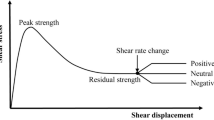Summary
In the past, it was generally considered that the wellpoint method was suitable only for sands and not for cohesive soils. This article introduces two case histories of dock foundation pits in which the excavation work of a clayey soil slope was stabilized by the wellpoint method. The effects of the wellpoint method in clayey soil may be summarized as follows: the total stress on the whole has not been changed, the pore water pressure has been dissipated constantly, and then yields a consolidation process in which the effective stress will increase correspondingly. In this work, the method of measuring shear strength during excavation and wellpoint pumping and the stability analysis method are also introduced. A large amount of observational data of pore water pressure, settlements and internal horizontal displacements and the vane shear strength indicated that the effect of wellpoint method is prominent, if the coefficient of permeability of a clayey soil is not less than 1 × 10−6 cm/sec.
Résumé
Dans le passé, il était généralement admis que la méthode des pointes filtrantes n’était utilisable que pur les sables et non pour les sols cohérents. Cet article décrit deux exemples d’excavations pour les fondations de ports au cours desquelles un talus de sol argileux fut stabilisé par la méthode des points filtrantes. Les effets de la méthode peuvent être résumés comme suit: la contrainte totale n’a pas changé, la pression intersticielle a été dissipée de façon constante et il en résulte un processus de consolidation dans lequel la tension efficace augmentera en conséquence. Dans cette étude, apparaissent aussi: 1°, une méthode de mesure de la résistance au cisaillement au cours de l’excavation et du pompage par les pointes filtrantes; 2°, une méthode d’analyse de la stabilité. D’une grande quantité de faits d’observation concernant la pression intersticielle, les tassements, les déplacements horizontaux internes et les essais au scissomètre, il résulte que l’effet de la méthode des pointes filtrantes est prédominant si le coefficient de perméabilité du sol argileux n’est pas inférieur à 1. 10−6 cm/sec.
Similar content being viewed by others
Author information
Authors and Affiliations
Rights and permissions
About this article
Cite this article
Chang, Ch., Sheng, Cw. Effect of wellpoints on stability of soft clay slopes in the process of excavation. Bulletin of the International Association of Engineering Geology 18, 147–152 (1978). https://doi.org/10.1007/BF02635362
Published:
Issue Date:
DOI: https://doi.org/10.1007/BF02635362




